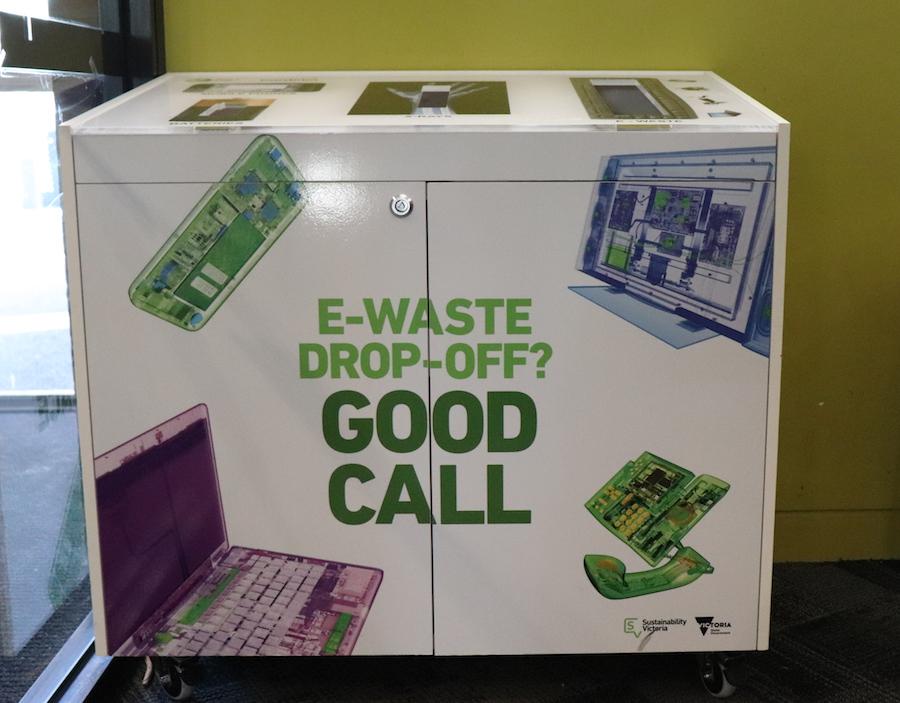E-waste (disposing of electrical and battery-operated items)
Key points
- E-waste is any item that has a battery, cord or plug, and is at the end of its useful life.
- This includes household batteries, battery-operated toys, devices and appliances.
- Batteries and e-waste are not allowed in your household bins. They have been banned from landfill in Victoria since 2019 and must be disposed of at specialised recycling facilities.
- Recycle small e-waste and batteries for free at any drop-off locations, larger items through the bookable hard waste service or your local transfer station (fees may apply at transfer stations. Please check their website for prices).
- Use the free online phone app Recycle Mate where you can photograph or search for an item and immediately find out where it can be recycled, refurbished or safely disposed of, based on your location.
What is e-waste?
E-waste is any item that has a battery, cord or plug, that is no longer working or wanted.
This includes many of the following:
- kitchen appliances (for example, microwaves, kettles, toasters, coffee machines),
- computers and accessories (for example, computer monitors, laptops, iPads, hard drives, mice, keyboards, headsets, microphones, webcams),
- mobile phones, phone chargers,
- TVs, VCRs, DVD recorders, remote controls,
- gaming devices (for example, Xboxes, PlayStations, Nintendo consoles, Switches, game controllers),
- desk lamps, floor lamps, torches,
- fans, heaters,
- hair dryers, hair straighteners,
- cameras, battery chargers,
- vacuum cleaners, irons,
- power boards and power tools.
How should I dispose of batteries and e-waste?
Use the free online phone app Recycle Mate (availble on both iPhone and Anrdoid) where you can photograph or search for an item and immediately find out where it can be recycled, refurbished or safely disposed of, based on your location.
Reuse, donate or sell
For good quality items you can:
- Sell or give them away through a garage sale or using online platforms/marketplaces.
- Give them to family or friends.
- Donate them to a charity like Mobile Muster or DV Safe Phone (for working smartphones only) who support people experiencing family and domestic violence.
Hard waste collection
- Large e-waste is accepted in bookable hard waste.
- For more info and to book, go to Council's Bookable hard waste webpage
Transfer stations
- Most local transfer stations accept some e-waste items such as TVs, computers and appliances for free, please check their website for the most up to date information.
Other drop-off points
These drop-off points are suitable for smaller e-waste items such as batteries, mobile phones and cables.
*If the box is full, please speak to the staff at the drop-off point first.
- Emerald Library
- Pakenham Library
- Cardinia Mobile Library
- Beaconsfield Home Timber and Hardware
- Bunyip Rural Supplies
- Koo Wee Rup Hospital reception
- Cardinia Shire Customer Service Centre, Officer
- Officeworks (Not accepting batteries)
- ALDI Supermarkets (Batteries only)
- Woolworths Supermarkets (Batteries, smartwatches, mobile phones, chargers and accessories only)
- Coles Supermarkets (Batteries only)
Why do I need to dispose of batteries and e-waste correctly?
When batteries and e-waste are put in household bins, they then get collected by waste and recycling trucks.
Once in these trucks they have a high risk of igniting and for a fire to rapidly spread inside the truck.
These fires put the truck drivers, employees, and the community at risk, as well as taking valuable resources from the emergency services to put them out.
E-waste also contains valuable materials, which through correct disposal can be recovered and used again. This reduces the need for new resources.
Most e-waste also contains toxic materials such as lead which can end up in our soil and waterways if not disposed of properly.
To find out more info, go to Sustainability Victoria's Where your e-waste goes webpage
More information
- For more info on e-waste, go to the Sustainability Victoria website
- For info on how to dispose of other common household items go to our A to Z waste guide

